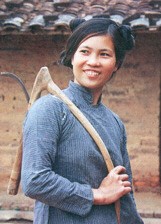Ngai in Vietnam

Photo Source:
Copyrighted © 2026
Asia Harvest All rights reserved. Used with permission |
Send Joshua Project a map of this people group.
|
| People Name: | Ngai |
| Country: | Vietnam |
| 10/40 Window: | Yes |
| Population: | 1,700 |
| World Population: | 1,700 |
| Primary Language: | Chinese, Yue |
| Primary Religion: | Ethnic Religions |
| Christian Adherents: | 3.00 % |
| Evangelicals: | 0.80 % |
| Scripture: | Complete Bible |
| Ministry Resources: | Yes |
| Jesus Film: | Yes |
| Audio Recordings: | Yes |
| People Cluster: | Chinese |
| Affinity Bloc: | East Asian Peoples |
| Progress Level: |
|
Introduction / History
Ngai people are originally from Guangxi, China, and some of them migrated south into Vietnam. Because no one, including the Chinese people, knows how to categorize the Ngai people, they were simply categorized as Hakka. Ngai people have never considered themselves Hakka especially since they speak different languages. A few Ngai live in Canada, Australia and the United States. In the U.S. you can find most Ngai people settled in Sacramento and Los Angeles County. In Vietnam, most Ngai people live in Dong Nai Province and Saigon and a few of them live elsewhere in Vietnam.
What Are Their Lives Like?
Most Ngai people are farmers. They also make their living through fishing, including crabs, shellfish and turtles. They celebrate Lunar New Year and moon day festivals. During the holiday they have a lion dance and a dragon dance, eat moon cakes and light firecrackers.
What Are Their Beliefs?
Their religion is ancestor worship. They also worship Tin Hau, a goddess to fishermen. They venerate spirits from the sea, including a mythical dragon.
What Are Their Needs?
The Ngai people need to submit to Jesus Christ so they can experience the abundant life He offers them in John 10:10.
Prayer Points
Pray that the Ngai people will have a spiritual hunger that will open their hearts to the King of kings.
Pray for workers who are driven by the love and boldness of the Holy Spirit to go to them.
Pray for the Lord to bless them spiritually and physically in such a way they give him praise.